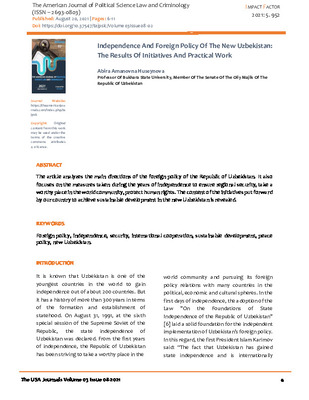Independence And Foreign Policy Of The New Uzbekistan: The Results Of Initiatives And Practical Work
Abstract
The article analyzes the main directions of the foreign policy of the Republic of Uzbekistan. It also focuses on the measures taken during the years of independence to ensure regional security, take a worthy place in the world community, protect human rights. The content of the initiatives put forward by our country to achieve sustainable development in the new Uzbekistan is revealed.

Downloads
Professor Member Of The Senate Of The Oliy Majlis Of The Republic Of Uzbekistan
-
Independence And Foreign Policy Of The New Uzbekistan: The Results Of Initiatives And Practical Work
The American Journal of Political Science Law and Criminology: No. 08 (2021) / Abira Huseynova,
-
Independence And Foreign Policy Of The New Uzbekistan: The Results Of Initiatives And Practical Work
The American Journal of Political Science Law and Criminology: No. 08 (2021) / Abira Huseynova,

Keywords:
Abstract
The article analyzes the main directions of the foreign policy of the Republic of Uzbekistan. It also focuses on the measures taken during the years of independence to ensure regional security, take a worthy place in the world community, protect human rights. The content of the initiatives put forward by our country to achieve sustainable development in the new Uzbekistan is revealed.
Similar Articles
-
Independence And Foreign Policy Of The New Uzbekistan: The Results Of Initiatives And Practical Work
The American Journal of Political Science Law and Criminology: No. 08 (2021) / Abira Huseynova, -
Independence And Foreign Policy Of The New Uzbekistan: The Results Of Initiatives And Practical Work
The American Journal of Political Science Law and Criminology: No. 08 (2021) / Abira Huseynova, -
Independence And Foreign Policy Of The New Uzbekistan: The Results Of Initiatives And Practical Work
The American Journal of Political Science Law and Criminology: No. 08 (2021) / Abira Huseynova,
References
Resolution "Strengthening regional and international cooperation to ensure peace, stability and sustainable development in the Central Asian region". UN, 22 June 2018.
Special resolution "Enlightenment and religious tolerance". UN, 12 December 2018.
"Special Resolution on the Declaration of the Aral Sea Region as a Zone of Environmental Innovation and Technology." UN, 18 May 2021.
Constitution of the Republic of Uzbekistan. Tashkent. 2018.
Law "On the Foundations of State Independence of the Republic of Uzbekistan". August 31, 1991. Lex.uz.
Law of December 26, 1996, On the basic principles of the foreign policy of the Republic of Uzbekistan. Bulletin of the Oliy Majlis of the Republic of Uzbekistan, 1997, №2.
Speech by the First President of the Republic of Uzbekistan Islam Karimov at the 48th Session of the UN General Assembly September 28, 1993.
Speech by the First President of the Republic of Uzbekistan Islam Karimov at the 48th Session of the UN General Assembly September 28, 1993.
Speech by President of the Republic of Uzbekistan Sh. Mirziyoyev at the 75th session of the UN General Assembly
“Central and South Asia: Regional Connectivity. Speech by President of the Republic of Uzbekistan Sh. Mirziyoyev at the international conference "Threats and opportunities". July 15-16, 2021.
Alisher Navoi. Mahbub ul-qulub. Works. Volume 13. Tashkent: Ghafur Ghulam Publishing House of Fiction, 1966. 185 p.
Huseynova A. Civil Society and Women: A Monograph. - Bukhara: Bukhara Publishing House, 2009. - 142 p.
Khuseinova, A.A. (2010). Human trafficking: an attempt to counteract. Sociological Research, (11), 150-151.
Kholova, E. Kh., & Khuseynova, A. A. (2012). The law of the Republic of Uzbekistan "On combating human trafficking". Modern scientific research, (12), 1-1.
Kholova, E. Kh., & Khuseynova, A. A. (2010). Law of the Republic of Uzbekistan "on combating human trafficking". Journal of Siberian Medical Sciences, (4).
Kenzhaeva, Kh.P., Tozhiev, F.I., & Zhuraev, B.N. (2014). The role of women in the creation and development of a democratic society in Uzbekistan. Innovation in Technology and Education, pp. 119-123.
Kenjaeva, X. P. (2021). The role of civic institutions in increasing women's social participation. Scientific progress, 1 (6), 957-961.
Kenjaeva, X. (2021). Educational issues in our national spiritual heritage. Society and Innovation, 2 (6 / S), 18-24.
Djuraeva, D. D., & Berdiyeva, Z. M. (2016). Cultural heritage as a factor of human development (on the example of Uzbekistan). Ученый XXI века, 23.





